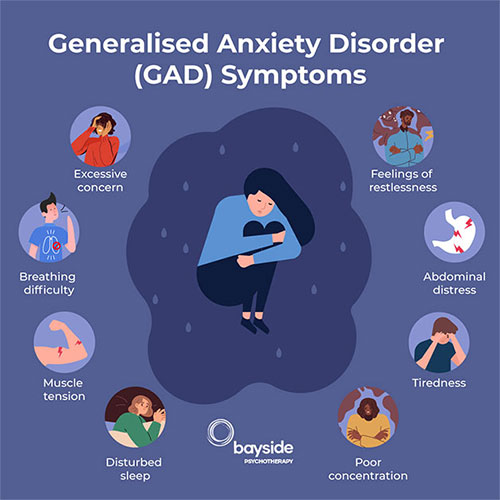Take the initial step toward healing with therapy for anxiety solutions
Take the initial step toward healing with therapy for anxiety solutions
Blog Article
Discovering Different Approaches in Therapy for Anxiety Condition for Lasting Adjustment
When tackling anxiousness conditions, it's vital to discover a variety of therapy methods. Each technique uses unique insights and tools to assist you handle your signs and symptoms efficiently. You may locate that incorporating techniques can yield the most effective outcomes. Nonetheless, understanding the nuances of these methods is vital to fostering enduring adjustment. Suppose the appropriate mix could launch a new degree of psychological health for you?
Recognizing Anxiousness Problems: A Quick Review
Anxiousness problems, which impact countless people worldwide, can significantly affect every day life. You could experience frustrating feelings of worry or fret that appear irrepressible. These sensations can bring about physical symptoms like an auto racing heart, sweating, or perhaps dizziness. Typical kinds of stress and anxiety disorders consist of generalized anxiousness problem, panic disorder, and social anxiousness disorder. Each has special signs, but they all share a tendency to interrupt your routine and relationships.Understanding the origin of your stress and anxiety is vital. It could come from genes, brain chemistry, or life experiences. Recognizing your triggers can assist you manage your feedbacks much better. It is necessary to bear in mind that you're not alone in this battle. Many individuals face comparable obstacles, and looking for help is a solid action towards feeling better. By finding out about anxiousness disorders, you're currently on the course to understanding and managing your condition more properly.
Cognitive-Behavioral Therapy: Challenging Adverse Thought Patterns

Determining Negative Thought Triggers
Identifying the specific triggers behind your adverse ideas can be essential in managing anxiety when you experience moments of distress. Start by paying attention to situations that provoke feelings of worry or worry. Is it a congested space, a future due date, or a conversation with certain people? Write down these instances in a journal. This will assist you recognize patterns in your thinking. Additionally, notification physical experiences that accompany your adverse ideas, like a racing heart or tightness in your upper body. By determining these triggers, you get insight right into what's sustaining your stress and anxiety. Comprehending these connections is the initial step in challenging those ideas and eventually restoring control over your emotional feedbacks.

Replacing Thoughts With Positives
Challenging negative idea patterns is an important action in changing your attitude and reducing anxiety. You may usually locate on your own caught in cycles of insecurity or catastrophic thinking. Rather than letting these thoughts dictate your sensations, technique changing them with favorable affirmations or realistic alternatives. For example, when you assume, "I can not manage this," change it to, "I can manage challenges one step at a time (Counseling services for anxiety)." This simple modification can significantly affect your psychological state. Consistently recognizing and countering these adverse ideas aids develop a much healthier internal discussion. Bear in mind, it requires time and initiative, however constantly practicing this technique can lead to long-term adjustment, equipping you to face anxiety with restored confidence and resilience
Structure Coping Methods Together
Changing unfavorable thoughts is just the start of handling anxiety properly. To produce lasting change, you require to develop coping methods that empower you. Cognitive-Behavioral Treatment (CBT) assists you determine and test those purposeless thought patterns. Together, you and your therapist can explore just how these ideas impact your sensations and behaviors.Start by developing sensible methods, like journaling or mindfulness workouts, that allow you to challenge anxiety head-on. When you encounter your fears slowly, you'll learn to respond differently.

Mindfulness and Acceptance-Based Approaches: Cultivating Present-Moment Recognition
As you navigate the intricacies of stress and anxiety, including mindfulness and acceptance-based methods can substantially enhance your capacity to grow present-moment understanding. By concentrating on the here and currently, you'll find that you can observe your thoughts and feelings without judgment. This technique helps you acknowledge your stress and anxiety without really feeling bewildered by it.Engaging in mindfulness exercises, such as deep breathing, body scans, or directed reflections, permits you to ground on your own in your current experience. Acceptance-based methods urge you to embrace your emotions as opposed to fight versus them. They lose their power over you.Incorporating these techniques into your everyday routine can change just how you react to stress and anxiety when you approve your feelings. You'll establish resilience and discover to browse stressful circumstances with higher simplicity. Inevitably, growing present-moment recognition lays the structure for long-term adjustment, empowering you to lead an extra meeting life.
Direct Exposure Treatment: Challenging Anxieties Progressively
Direct exposure treatment assists you face your worries in a gradual way, making it much less frustrating. You'll discover methods to face anxiety-provoking situations action by action, while likewise building coping strategies to handle your responses. This method empowers you to take control and decrease stress and anxiety in time.
Progressive Exposure Techniques
When facing anxiety, slowly challenging your fears can be an effective way to gain back control. This technique, called gradual direct exposure, includes more info gradually revealing yourself to the circumstances or items that trigger your anxiousness. Begin with much less challenging scenarios and progressively work your method up to even more challenging ones. For circumstances, if you hesitate of public talking, you might start by speaking in front of a mirror, after that advance to sharing ideas with a good friend, and eventually attend to a small team. Each step aids desensitize you to the concern, building your self-confidence gradually. Remember, it's necessary to rate yourself and celebrate little triumphes as you relocate via this process, strengthening your capacity to manage stress and anxiety properly.
Structure Coping Strategies
Structure reliable coping strategies is vital for taking care of anxiousness, especially as you confront your worries slowly. One powerful technique is direct exposure treatment, where you begin by encountering your anxieties in a controlled manner. Begin with less intimidating circumstances and slowly function your method approximately even more challenging situations. This gradual exposure helps desensitize you to anxiousness sets off, making them much less overwhelming.Incorporate leisure techniques, such as deep breathing or mindfulness, to relax your mind throughout exposure. Track your progression, celebrating little success in the process to boost your self-confidence. Keep in mind, it's fine to take your time; the objective isn't perfection but constant enhancement. By developing these methods, you'll equip yourself to navigate anxiety and embrace life extra totally.
Psychodynamic Treatment: Discovering Origin of Anxiousness
Psychodynamic treatment discovers the subconscious mind, revealing the origin of your stress and anxiety - Counseling services for anxiety. By analyzing your ideas, feelings, and previous experiences, this strategy helps you reveal underlying conflicts and unsettled concerns that may add to your current anxiousness. You'll collaborate with a specialist to explore childhood years experiences, connections, and emotional patterns that form your responses today.As you acquire insight right into these much deeper layers of your subconscious, you'll start to recognize exactly how past events affect your existing behavior. This understanding can lead to catharsis, enabling you to refine emotions you might have suppressed.Through the therapeutic relationship, you can likewise recognize defense reaction that might have created over time, providing a clearer path to transform. Inevitably, psychodynamic therapy outfits you with the tools to address your stress and anxiety at its core, advertising long lasting transformation in your psychological wellness
Alternative and integrative Techniques: Incorporating Methods for Greater Effectiveness
Integrating numerous restorative strategies can enhance your trip towards handling anxiousness better. By incorporating aspects from cognitive-behavioral therapy, mindfulness techniques, and all natural methods, you can create a tailored strategy that resolves your special demands. You could use cognitive-behavioral strategies to challenge unfavorable thought patterns while including mindfulness workouts to ground yourself in the existing moment.Additionally, checking out holistic techniques such as yoga or reflection can promote relaxation and minimize anxiety symptoms. This blend enables you to develop better self-awareness and resilience.Experimenting with these varied techniques can help you uncover what reverberates most with you. Keep in mind, it has to do with finding a harmony that functions, rather than staying with a single approach. This integrative approach not just supplies immediate relief yet likewise fosters long-term abilities for handling stress and anxiety, encouraging you to recover control over your life.
The Role of Support Systems: Building Strength With Connection
While it could seem that taking care of stress and anxiety is a solitary trip, having a strong assistance system can play a necessary role in your durability. Surrounding on your own with empathetic good friends, family, or assistance groups produces a safe area where you can openly share your experiences and sensations. When you get in touch with others, you advise yourself that you're not alone in this struggle.These relationships offer inspiration and can give sensible coping methods that have helped others. It's additionally a chance to gain point of view; buddies can help you see circumstances in a different way, minimizing feelings of isolation.Moreover, emotional assistance cultivates a feeling of belonging, which can substantially relieve anxiety symptoms. By leaning on your support system, you can construct resilience and tackle challenges better. Remember, getting to out for help suggests toughness, and it can make all the distinction in your trip towards managing stress and anxiety.
Often Asked Questions
What Are the Common Signs And Symptoms of Anxiety Disorders?
You might experience restlessness, fatigue, problem focusing, impatience, muscular tissue stress, and rest disruptions. Physical signs and symptoms can consist of quick heartbeat, sweating, and trembling. Recognizing these indicators early can aid you look for proper assistance and therapy.

How Much Time Does Therapy Generally Last for Anxiousness Disorders?
Therapy for anxiousness disorders generally lasts anywhere from a few weeks to numerous months. It actually depends on your private needs, progress, and the strategies your therapist makes use of to help you handle your anxiety efficiently.
Can Drug Be Made Use Of Together With Treatment for Anxiety?
Yes, medicine can most definitely be made use of together with therapy for anxiety. Integrating both approaches commonly boosts therapy performance, aiding you manage symptoms while exploring underlying issues with counseling. Constantly consult your health care copyright for customized suggestions.
Are There Self-Help Strategies for Managing Anxiety?
Yes, there are a number of self-help methods for managing stress and anxiety. You can exercise mindfulness, involve in routine workout, preserve a balanced diet, develop a routine, and use deep breathing techniques to assist decrease anxiousness symptoms efficiently.
Just how Do I Know if I Need Professional Assistance for Stress And Anxiety?
You ought to take into consideration looking for specialist aid for anxiety if it disrupts life, causes significant distress, or if self-help strategies aren't functioning. Trust fund your reactions; getting to out can bring about far better coping skills and support. Typical types of stress and anxiety conditions consist of generalized anxiety disorder, panic problem, and social stress and anxiety condition. When you experience moments of distress, identifying the certain triggers behind your unfavorable thoughts can be vital in handling stress and anxiety. Replacing adverse thoughts is only the start of handling anxiety properly. By examining your thoughts, sensations, and past experiences, this approach aids you discover underlying conflicts and unresolved concerns that might contribute to your existing anxiety. It's additionally a possibility to gain perspective; friends can help you see situations differently, lowering feelings of isolation (Counseling services for anxiety).Moreover, psychological support promotes a feeling of belonging, which can considerably alleviate stress and anxiety symptoms
Report this page